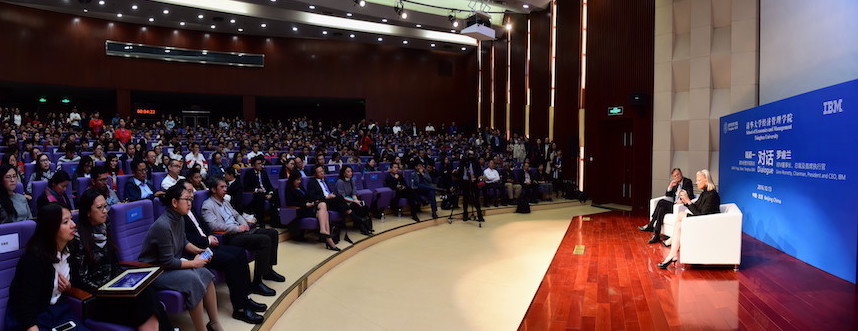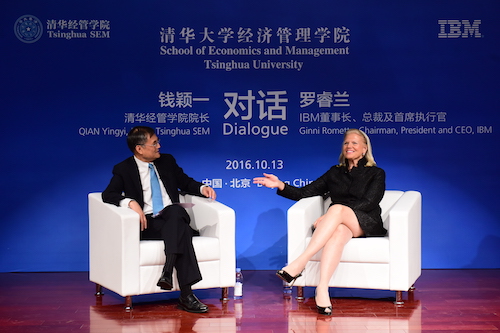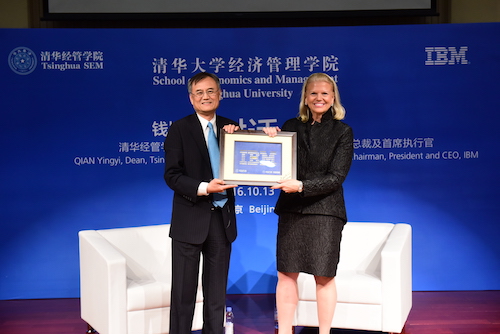Tim
Hesler, GMBA Class of 2017

IBM Chairman,
President, and CEO Ginni Rometty sits down with Tsinghua SEM’s Dean Qian for a
fireside chat with a packed house at Weilun Auditorium.
On October 13, 2016, IBM
Chairman, President, and CEO Ginni Rometty joined an eager Tsinghua SEM
audience to share her thoughts via a three-prong forum titled Transformation in
the Era of Cognitive Business. Ms. Rometty first delivered a short speech,
sharing some of the exciting developments she was observing at IBM and
globally, then joined Dean Yingyi Qian for a fireside-chat-style dialogue
before opening the conversation more widely to the audience.
Ms. Rometty opened by
discussing an emerging emphasis on cognitive business. If “being digital” is
now ubiquitous, what now distinguishes one digital company from another? The
answer, suggests Ms. Rometty, lies not simply in having access to data but in
having unique capacity to make use of that data. To that point: 90% of world’s
data was created in the last two years; however, 80% of that data is
unstructured (not readable by computers) – until the arrival of cognitive
computing.
According to her,
cognitive functionality is, at its core, less about artificial intelligence
than about augmenting the user’s intelligence. One means of doing so is by allowing for interaction with data in
(verbal) language. An example of this is IBM’s Watson, which is “trained” in
eight languages and 20 different fields – the first of which was oncology.
Although Watson’s highest application priority in the early stages was medical,
its use has expanded to disciplines such as education – for example, by aiding
in matching Sesame Street videos to a child’s individual learning style.

Dean Qian and Ms.
Rometty take a stroll down memory lane, reminiscing about the parallels between
IBM’s and Tsinghua’s histories before analyzing the institutional paths ahead.
After Ms. Rometty had
shared some of the most compelling implications of Watson and cognitive computing,
she joined Dean Qian to further explore both her narrative and the concept of
cognitive business. Dean Qian opened the dialogue session by pointing out some
parallel institutional milestones. Coincidentally, IBM and Tsinghua University
were both founded in 1911. IBM’s initial formal ventures into China in 1984
also coincided with the creation of Tsinghua’s School of Economics and
Management.
They then explored IBM’s
various advances into China, including its landmark joint venture with Great
Wall Computer Corp. in the early 2000s. Ms. Rometty reflected on a variety of
IBM’s recent pursuits, including Green Horizons, which draws on cognitive
computing and the Internet of Things to make inroads into addressing
environmental concerns – for example, by forecasting pollution up to 72 hours
in advance. In discussing Watson and other forthcoming cognitive computing
capabilities, Ms. Rometty characterized coming tech shifts as increasingly
creating a “world of man and machine,” rather than the more bifurcated conception of “man vs. machine.”
Ms. Rometty pointed out
that of IBM’s 400,000 employees – “IBMers,” as they are affectionately known –
about 50% are Millennials, noting good-naturedly that Apple isn’t the only
jean-wearing culture. She also pointed to the example of IBM’s work with Apple
to illustrate that the tech landscape is in some respects becoming more
collaborative and less purely competitive in the traditional sense.
IBMers are, of course,
increasingly drawn from a global skilled labor force. Through the U100 program,
IBM is striving to bring modern curricula and data analytics to universities in
China. According to Ms. Rometty, this isn’t simply a gesture of goodwill, but
also ultimately an effort to groom future employees. IBM’s procedures in China,
she says, are about talent, not low-cost labor. In fact, Ms. Rometty’s points
of greatest optimism about China are its talent and its work ethic.
During the broader
Q&A session, one audience member asked Ms. Rometty to expand on blockchain,
noting that it had become a hot topic in China. Ms. Rometty described blockchain
as offering a way to have multiple parties view that a transaction is trusted;
she furthermore speculated that it would ultimately save hundreds of billions
of dollars. To her mind, blockchain has a chance to do for transactions what
the Internet did for communications and information.
As the conversation
navigated towards its conclusion, Ms. Rometty fielded a question about the
leadership quality she most valued. Rather than settling on any one quality,
she offered up three. First, she pointed to the increasing importance of
curiosity. As humans’ lifespans statistically grow longer, she suggested,
“you’ve got to continue to learn.” Second, she considers passion a must for
leadership. Finally, Ms. Rometty has come to view boldness as an essential
leadership trait – one she herself had to learn. After all, “Growth and
comfort,” she notes, can “never coexist.”

Commemorative gift
exchange as a token of appreciation.